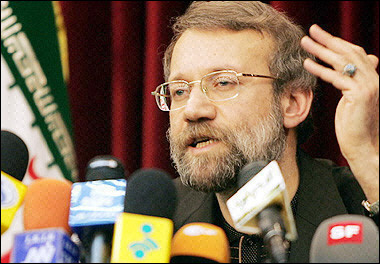Iran Nuclear Issue
Iran flexible on inspectors, not core nuclear issue
(Reuters)
Updated: 2006-03-16 17:27
 |
Large Medium Small |
Iran on Thursday offered more access to UN inspectors if their watchdog agency, not the UN Security Council, dealt with its nuclear dispute with the West.
But top negotiator Ali Larijani gave no ground on Western demands that Iran stop trying to produce fuel that can be used in nuclear power stations or, if highly enriched, in bombs.
 Iran's chief nuclear negotiator Ali Larijani speaks at a news conference in January 2006. Larijani wrote to IAEA chief Mohamed ElBaradei warning that if Tehran is sent to the Security Council, Iran would move ahead on industrial-level uranium enrichment, producing material that can be used for a nuclear reactor or an atom bomb.[AFP] |
Britain, one of three European Union powers whose talks with Iran proved fruitless, again ruled out military action.
The International Atomic Energy Agency has referred Iran to the Security Council, which can impose sanctions, for failing to demonstrate that its nuclear program was purely peaceful.
In response, Iran has carried out a threat to suspend snap IAEA inspections of its nuclear facilities.
"The most logical way was to have the case with the agency and to have the agency's supervision," Larijani, secretary of Iran's Supreme National Security Council, told reporters.
"We think it is not too late to accept this. It is to their benefit, which means that the agency's inspectors can become active. But if they (Western countries) want to use another path, their supervision will be reduced and other problems will come up," he said. He did not elaborate.
Britain, France and the United States want the Security Council to issue a statement that would express "serious concern" about Iran's nuclear program and would ask the IAEA to report quickly on Iranian compliance with its demands.
Moscow has offered to enrich uranium for Iran to guard against any diversion of fuel for bombs, but talks have stumbled on Tehran's insistence on doing some enrichment at home.
STRESS ON DIPLOMACY
The Russian compromise is seen by many as the best hope for defusing the dispute, but Western officials suspect Iran is discussing it only to gain time and stave off sanctions.
Russia and China oppose subjecting Tehran to any UN embargo, which both could veto as permanent Security Council members.
"We both believe we need to seek political solutions to the issues through diplomatic channels," Russia's ambassador to China, Sergei Razov, told reporters in Beijing.
He said Russian President Vladimir Putin and Chinese President Hu Jintao would discuss the Iranian and North Korean nuclear disputes when Putin visits China next week.
Chinese Foreign Ministry spokesman Qin Gang said there was still space for diplomacy over Iran.
"All the parties concerned should show more patience and flexibility and seize every moment to resolve the issue peacefully," he told a separate news conference.
British Foreign Secretary Jack Straw said sanctions, but not military force, might be used to get Iran to change its mind.
"Let me make one thing clear from the outset: military actions are not on the agenda," Austrian newspaper Die Presse quoted him as saying. "We don't want a confrontation with Iran."
The White House, in a new national security strategy, named Iran as America's greatest challenge from a single country.
President George W. Bush has insisted on a diplomatic outcome, but has never taken the military option off the table, despite the US entanglement in neighboring Iraq.
"This diplomatic effort must succeed if confrontation is to be avoided," said the White House document.
It said Iran also sponsors terrorism, threatens Israel, seeks to thwart Middle East peace, disrupts democracy in Iraq and denies freedom to Iranians. It said these concerns could only be resolved if Iran completely changed course.
"Our strategy is to block the threats posed by the regime while expanding our engagement and outreach to the people the regime is oppressing," the document said.